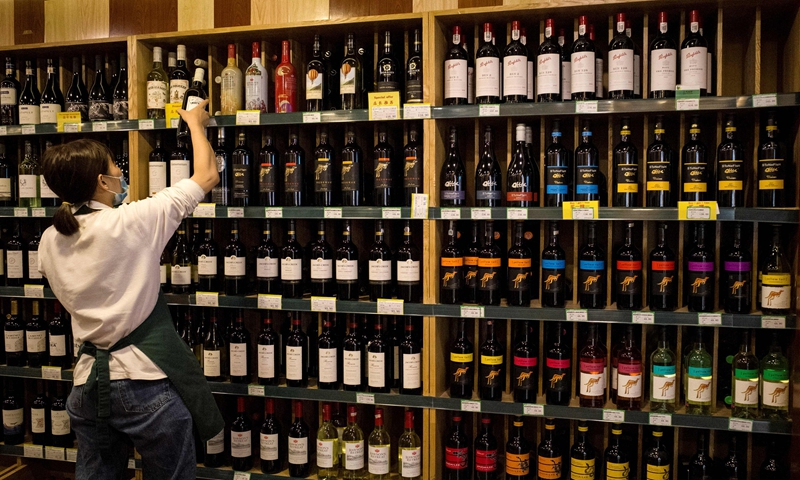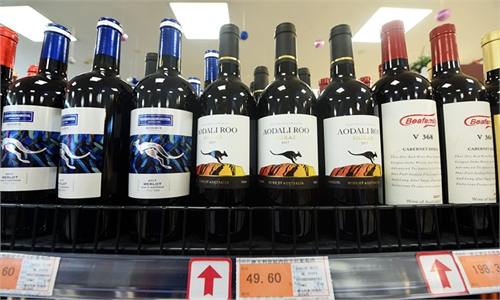
Bottles of Australian wine on the shelf of a supermarket in Beijing on August 18, 2020. On the same day, China's Ministry of Commerce announced the probe into Australian wines sold in containers of two liters or less. Photo: VCG
Australia's push for a WTO probe into China's anti-dumping tariffs on Australian wines may have the ulterior motive of smearing China, but its intention is not going unnoticed and will not succeed, Chinese analysts said.
On Tuesday, the WTO said that it will set up a dispute-settlement panel to address Australia's complaint over Chinese tariffs imposed on its wine.
The action by the Geneva-based trade body came on a second request by Australia. Its first request in June was blocked by China, a routine procedure that's permitted under WTO rules.
Chinese analysts said that China has solid evidence for its decision to place anti-dumping duties on Australian wines and will defend its interests by all means.
Chen Hong, a professor and director of the Australian Studies Center at the East China Normal University, told the Global Times on Wednesday that Australia's latest move may have the ulterior motive of politicizing and weaponizing the trade dispute to slander China.
Australia has been trying to smear China with labels such as economic coercion and trade bully, and so its latest move at the WTO is more of a parallel action to couple with its political campaign against China to mislead the international community, Chen said.
China in March imposed anti-dumping measures that raised tariffs, with the maximum rate of 218.4 percent levied on Australian wines.
Chen Wei, a wine importer, told the Global Times on Wednesday that even if the ruling by the panel favors Australia, it will not change the situation regarding the country's wine exports to China, as bilateral ties remain frayed.
Importers have diversified to other sources, and part of the market share previously held by Australian wine is now held by US wine, Chen said.
Tu Xinquan, dean of the China Institute for WTO Studies at the University of International Business and Economics in Beijing, told the Global Times on Wednesday that even after the panel comes out with a decision months later, China could file for a further ruling should it find the decision unfavorable.
Chen Hong said the Australian government is well aware of this scenario so the latest action mainly serves its political intentions.
China's permanent mission to the WTO said on Wednesday that it regretted at Australia's second request, and that it would vigorously defend its legitimate measures in the following proceedings and is confident that its challenged measures are consistent with relevant WTO rules.
With bilateral ties in a downward spiral, a number of Australian goods, including timber, coal and lobsters, have run into trouble in China. China also placed duties on barley.
On Wednesday, China's Foreign Ministry spokesperson Zhao Lijian pointed out that some Australian politicians have frequently politicized and stigmatized normal trade and investment between China and Australia, and this caused Chinese investment into Australia to plunge by 61 percent in 2020.
Zhao made the remarks when commenting on the decline in Chinese investment in Australia and its trade official's pledge to diversify.
China's total overseas direct investment increased by 12.3 percent year-on-year in 2020 to reach $153.71 billion as the world's largest outward direct investment country.
Zhao urged Australian politicians to view China-Australia economic and trade cooperation in an objective light and offer fair and non-discriminatory environment to Chinese companies.

Bottles of Australian wine on the shelf of a supermarket in Beijing on August 18, 2020. On the same day, China's Ministry of Commerce announced the probe into Australian wines sold in containers of two liters or less. Photo: VCG
Australia's push for a WTO probe into China's anti-dumping tariffs on Australian wines may have the ulterior motive of smearing China, but its intention is not going unnoticed and will not succeed, Chinese analysts said.
On Tuesday, the WTO said that it will set up a dispute-settlement panel to address Australia's complaint over Chinese tariffs imposed on its wine.
The action by the Geneva-based trade body came on a second request by Australia. Its first request in June was blocked by China, a routine procedure that's permitted under WTO rules.
Chinese analysts said that China has solid evidence for its decision to place anti-dumping duties on Australian wines and will defend its interests by all means.
Chen Hong, a professor and director of the Australian Studies Center at the East China Normal University, told the Global Times on Wednesday that Australia's latest move may have the ulterior motive of politicizing and weaponizing the trade dispute to slander China.
Australia has been trying to smear China with labels such as economic coercion and trade bully, and so its latest move at the WTO is more of a parallel action to couple with its political campaign against China to mislead the international community, Chen said.
China in March imposed anti-dumping measures that raised tariffs, with the maximum rate of 218.4 percent levied on Australian wines.
Chen Wei, a wine importer, told the Global Times on Wednesday that even if the ruling by the panel favors Australia, it will not change the situation regarding the country's wine exports to China, as bilateral ties remain frayed.
Importers have diversified to other sources, and part of the market share previously held by Australian wine is now held by US wine, Chen said.
Tu Xinquan, dean of the China Institute for WTO Studies at the University of International Business and Economics in Beijing, told the Global Times on Wednesday that even after the panel comes out with a decision months later, China could file for a further ruling should it find the decision unfavorable.
Chen Hong said the Australian government is well aware of this scenario so the latest action mainly serves its political intentions.
China's permanent mission to the WTO said on Wednesday that it regretted at Australia's second request, and that it would vigorously defend its legitimate measures in the following proceedings and is confident that its challenged measures are consistent with relevant WTO rules.
With bilateral ties in a downward spiral, a number of Australian goods, including timber, coal and lobsters, have run into trouble in China. China also placed duties on barley.
On Wednesday, China's Foreign Ministry spokesperson Zhao Lijian pointed out that some Australian politicians have frequently politicized and stigmatized normal trade and investment between China and Australia, and this caused Chinese investment into Australia to plunge by 61 percent in 2020.
Zhao made the remarks when commenting on the decline in Chinese investment in Australia and its trade official's pledge to diversify.
China's total overseas direct investment increased by 12.3 percent year-on-year in 2020 to reach $153.71 billion as the world's largest outward direct investment country.
Zhao urged Australian politicians to view China-Australia economic and trade cooperation in an objective light and offer fair and non-discriminatory environment to Chinese companies.


